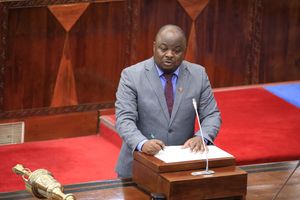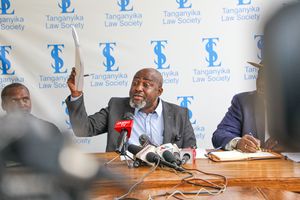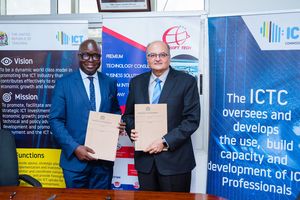TangaYetu: Reshaping a future-ready city through youth empowerment
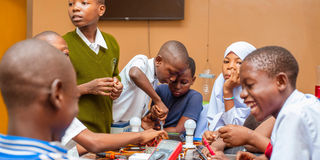
Some students during a practical session of one of their STEM subjects at the STEM Park Tanga, funded by Fondation Botnar as part of the TangaYetu programme.
What you need to know:
- Launched in 2019, the TangaYetu Programme was born from a bold vision: make Tanga a city where young people are safe, empowered, educated, and connected.
In the coastal city of Tanga, a quiet transformation is unfolding—led not by mega projects or foreign investors, but by carpenters, schoolgirls, fishermen, and digital freelancers. At the centre of it all is one idea: if a city truly listens to its young people, it can rebuild itself from the inside out.
A growing city, a forgotten generation
Tanga City is one of Tanzania’s faste growing urban areas. With more than 70% of its population under the age of 35 years, its future rests on the shoulders of its young people. Yet for years, youth in Tanga have faced deep structural barriers—underfunded schools, high unemployment, poor access to digital tools, and limited participation in local decision-making.
In schools, students sat two or three to a desk—if there was one at all. In classrooms across the city, teachers faced the painful reality of children in upper primary grades who still couldn’t read a paragraph or solve a basic equation.
Outside of school, most youth had little access to training, income, or safe spaces for recreation or innovation.
In a city full of potential, thousands of young people felt stuck—waiting for a chance that might never come.
A city-wide commitment to youth
Launched in 2019, the TangaYetu Programme was born from a bold vision: make Tanga a city where young people are safe, empowered, educated, and connected.
Supported by Fondation Botnar and implemented in the first three years by Economic and Social Research Foundation (ESRF) and INNOVEX Development Consulting Limited as the fund manager, the he program brought together government, civil society, private sector and the youth themselves to co-design solutions to the city’s biggest challenges. Rather than focusing on one sector, TangaYetu invested in Health, Skills,Innovation, Education and Entrepreneurship.
In education, the program supplied 4,090 desks to primary schools and 3,846 tables and 3,019 chairs to secondary schools, directly improving learning environments for over 16,000 students.
These weren’t just procured, they were built by 113 local youths and adults in Tanga City, creating jobs and skills in carpentry.
To address low literacy and numeracy outcomes, the TangaYetu Program rolled out the Teaching at the Right Level (TaRL) approach in 20 primary schools across Tanga City. 2,000 students from classes 3 to 6 were assessed in reading and mathematics skills.
Students were grouped by ability rather than by grade:
∙630 students enrolled in numeracy remedial sessions, with 405 students successfully graduating after mastering basic operations.
∙ 473 students enrolled in literacy sessions, and 377 students graduated after improving their reading fluency.
Teachers were trained to use interactive methods such as songs, games, and storytelling to help struggling learners catch up and build confidence in learning.
In digital skills, TangaYetu trained 100 youth in areas such as graphic design, content creation, and freelancing. Many used mobile phones to complete their training and later earned income online. In just six months, trainees earned a combined income of Sh 10 million, with several taking on clients, mentoring others or starting their own businesses.
In agriculture and aquaculture, over 360 youth were trained in fisheries, seaweed farming, crab fattening, poultry and horticulture. Many formed savings and lending groups—some accumulating over Sh 13 million—and started reinvesting in their own private ventures.
In child protection and safety, the programme helped establish 104 antiabuse clubs in schools, rescued 12 children from child labor, and reached over 80,000 people with awareness campaigns. The Programme also implemented infrastructure improvements, including footpaths, signage, and safety zones, benefiting over 10,000 schoolchildren under the Road Safety City Project.
And in public innovation, the program launched Tanzania’s first STEM Park, reaching over 30,000 students with hands-on science learning, created East Africa’s first City Observatory—a platform for data collection, citizen feedback, and youth-led monitoring and renovated Jamhuri Park also known as Forodhani.
The park’s redevelopment was driven by a commitment to inclusivity and functionality, ensuring it meets the diverse needs of Tanga’s residents. From serene green spaces that offer a tranquil escape to modern play areas for children, the park is designed to welcome everyone.
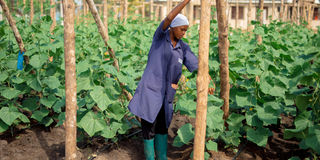
A young farmer at Tumbilini Youth Empowerment Centre taking care of the training farm after learning modern farming through the TangaYetu programme.
From margins to momentum
The most powerful change TangaYetu has sparked may be the hardest to measure: belief.
In classrooms, teachers no longerdeliver lectures to disengage students— they now guide learners grouped by ability, watching them grow week by week. One teacher at Majengo Primary School, Mwajabu Ally, reflected:
“Using songs, games, and interactive teaching methods, children who once struggled to read and count are now excelling.”
Some parents were initially hesitant to enroll their children in the TARL programme, as they had been previously informed that their children had learning disabilities but now watch them read street signs and newspapers, a parent at Kana Primary School, remembered how discouraged she had been:
“I used to think my son was bewitched. Teachers said he had learning difficulties. Now he reads newspapers to me.”
For Zainab Msafiri, a 33-year-old mother who joined the digital skills project, the change was transformative. She now designs posters, manages social media pages, and earns money through her business, Aghena General Supplies.
She’s also mentoring two youth in her community.
“My goal isn’t just to benefit myself,” Zainab explains. “I want to share what I have learned with others so they can benefit from the same opportunities,” Zainab said. “Now, I do it all from my phone. I even worked with the TangaYetu team and covered events on Instagram for Next Step Foundation in Kenya.”
In coastal areas, youth once seen as unproductive are now running poultry coops, harvesting seaweed, fishing or participating in sea cucumber farming collectives. Others are forming cooperatives, reinvesting savings, and helping others get started.
Shali Bakari, a participant in the fisheries project, shared “In the past, we would wake up not knowing where to go or what to do. Life was a struggle,” Shali recalls.
“But after receiving the boat and fishing gear from TangaYetu, everything changed. Now, we have a purpose—we wake up, go to the sea, and return with something to support our families.”
Public spaces are changing too.Jamhuri Park, once abandoned, is now a vibrant youth economic zone with over 50 active vendors—proof that when youth are trusted to lead, they revitalize the spaces around them.
What happens when a city believes in its youth?
TangaYetu is a city-building approach rooted in youth agency and community co-design. It shows that transformation does not come from top-down announcements—but from making thousands of small, smart, human-centered decisions over time.
As the programme enters its second phase managed by INNOVEX Development Consulting Limited in collaboration with Tanga City Council, the focus is on scaling areas such as health and wellbeing, economic empowerment, educational enhancements, social and community engagement, technology and innovation without forgetting environmental sustainability.
Acknowledging the progress made, the challenge ahead is sustainability— ensuring that youth-led initiatives continue after the funding cycle ends.
To do that, TangaYetu is strengthening local government capacity, investing in mentorship pipelines, and embedding community-led monitoring systems through platforms like the City Observatory.
The programme also offers a model for other cities across Tanzania and the world. It demonstrates that youth are not a problem to solve—they are the solution we have been waiting for.
